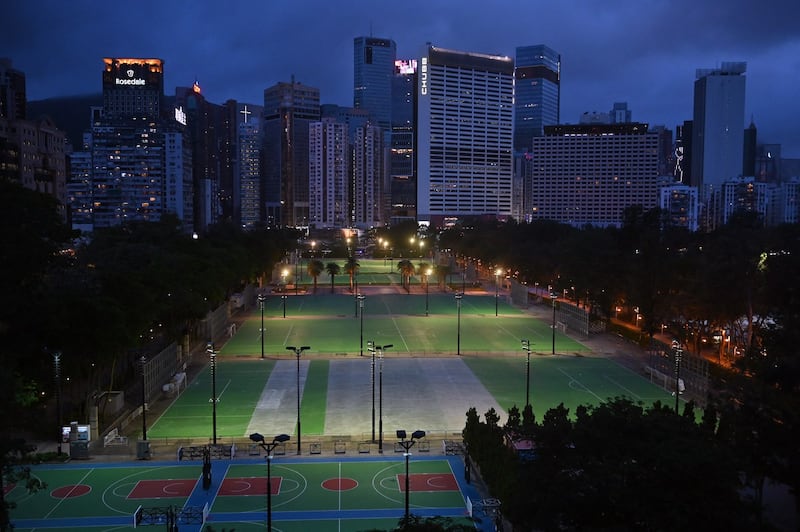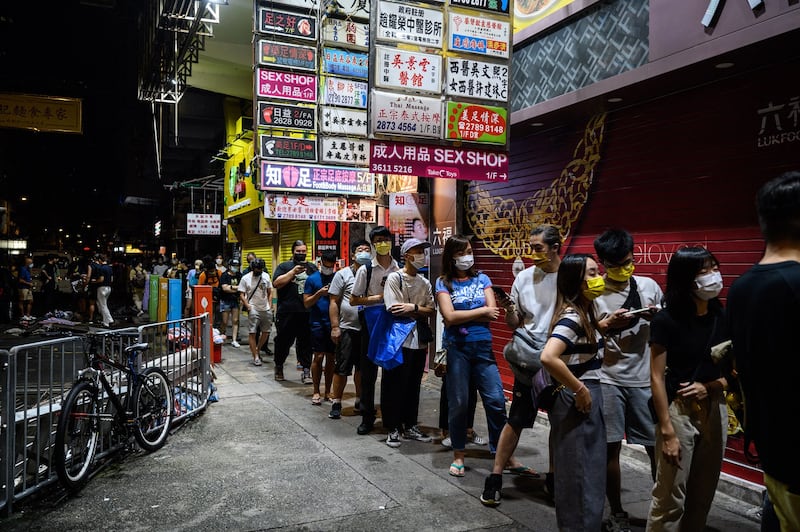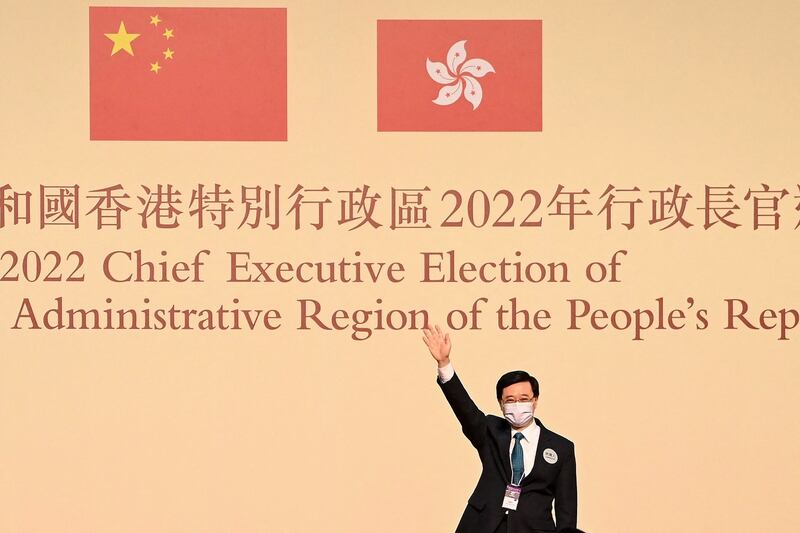On July 1, 1997, the British flag came down for the last time in Hong Kong, as the city returned to Chinese rule.
The ruling Chinese Communist Party (CCP) under Deng Xiaoping had promised it could run its own affairs under "one country, two systems," with the city's freedoms preserved for at least 50 years, and with progress promised towards fully democratic elections.
The reality has been rather different. Just 25 years after the handover, Hong Kong is no longer the world's freest economy and has plummeted in global press freedom rankings following a citywide crackdown on dissent under the national security law.
"People who stayed are like the frog in a pan of gradually warming water," economist Law Ka-chung told RFA. "Maybe some of them think everything's fine, but others see a huge difference."
Today, not a single promise made by Chinese leaders before the handover has been kept. Halfway into the 50-year grace period, Hong Kong is already unrecognizable to many.
"Since the National Security Law came in, there's a lot of things you can't say any more; a lot of things you can't write; even people you can't interview," former Stand News journalist Lam Yin-bong told RFA.
The last races under British rule took place in June 1997. More than H.K.$2.5 billion in bets were placed.
Under "one country, two systems," China promised that "the horses will run as usual, and people can keep on partying."
Now, people's lives may appear similar on the surface, but what was once the world's freest economy no longer gets its own separate trading status.
Once known as Asia's World City, Hong Kong is seen as just another Chinese city now
"Important stuff like politics, the economy, used to be very different from mainland China," Law said. "The way we collected data, our stock market."
"But it all changed gradually until there was no difference at all."

Flagging confidence
On the day of the handover, the Hang Seng Index closed at 16,365 points. "One country, two systems" meant that capitalism would stay, and that the city would remain a financial center.
In March 2022, the Hang Seng stood at around 18,000 points a rise of only a few percent over 25 years.
According to Law, foreign investment in Hong Kong has fallen in the past few years, and a lot of operations are now being directed from mainland China
"Right from the start, they started bringing in new people to work in important sectors like financial and banking, but not so people would notice that they'd replaced an entire sector," he said. "They did it in the non-profit sector too: in schools, in higher education, where they carried out brainwashing until it was all being run by their people."
"All the university vice chancellors are from mainland China now. Can you find me a single one who isn't?"
The annual vigils for the 1989 Tiananmen massacre were once seen as an important test of the 'one country, two systems' promise in practice.
In the years after the handover, Hong Kong continued to be the only Chinese city to hold them.
On the 30th anniversary of the crackdown, 180,000 people turned out for the once-annual candlelight vigil in Victoria Park.
But by 2022, nobody was lighting candles in Victoria Park on June 4 any more.
Instead, key areas of the park were closed for the anniversary and guarded by police, who warned passers-by to move on.
A COVID- ban on public gatherings was also in place making the lack of vigil less surprising.
"Gathering to remember the Tiananmen massacre is a very peaceful thing to do," a man in a commemorative T-shirt told RFA on the day in the nearby Causeway Bay shopping district.
"The government says it wasn't a massacre but an incident. Whatever they call it they'll find every excuse in the book to stop [any commemoration] from happening," he said.
"If even peaceful events aren't allowed, then what freedom do we have?"
Protests now a thing of the past
Under the terms of the handover, Hong Kong was promised freedom of association, and was once the protest capital of Asia, with wave after wave of mass protests since the handover, including the 2003 march against national security laws, the 2012 movement against the CCP's "patriotic education" program in Hong Kong schools, and the 2014 Umbrella movement for fully democratic elections.
In 2019, millions took to the streets to protest plans to allow the extradition of alleged criminal suspects from Hong Kong to face trial in mainland China, in a mass movement that occupied the Legislative Council and brought international outrage over the brutality of the police response to mostly unarmed young people.
Now, only trams and buses ply the once-familiar march route from Causeway Bay to government headquarters in Admiralty.
The advent of the National Security Law has turned Hong Kong's regular street protests and vigils -- a bellwether for freedom of assembly -- into a thing of the past, with the groups that once organized them forced to close and their leaders arrested.
One by one, prominent civil society groups have been forced to close, including the Professional Teachers' Union, the Confederation of Trade Unions, and the Hong Kong Alliance in Support of Patriotic Democratic Movements of China, which once organized the candlelight vigils on June 4.
Dissenting voices are barely heard in public any more.
"We have nothing left now, so I felt I needed to make a bit of a fuss," Italian priest-turned-rights activist Franco Mella told RFA after a brief, protest of just three people.
"A small fuss is better than no fuss," he said.
Mella is scathing about the Hong Kong government's handling of the 2019 protest movement.
"When one million or two million take to the streets, it's the government's job to know why," he said. "An intelligent government would understand that, right? Rather than cracking down and banning stuff."
Many of Mella's friends are now in prison for their activism.
"All they ever aimed to do was to care for others; to guide them in whatever direction," he said. "That's not a reason to send them to prison."

Not the old Hong Kong
Social activist Tsang "The Bull" Kin-shing agreed, telling reporters on his release from Stanley Prison: "Right now we have lawyers, professors, doctors, students, lawmakers in jail or on remand."
"The Hong Kong we are living in today isn't the old Hong Kong we used to know," he said after serving a jail term for "incitement to illegal assembly" linked to his role in the 2019 protest movement.
Meanwhile, citizen journalist Lam Yin-bong, who covered Tsang's release, said he has been frozen out of opportunities to cover the news because he isn't affiliated to an approved news organization.
"I can't go to regular press events like news conferences with [incoming leader] John Lee," Lam told RFA. "They wouldn't let me in even if I wanted to go to them, because I don't have an official press pass."
"This is government policy. You need that pass to book a place. So, I mostly cover stuff that happens on the street, like political prisoners being released, stuff that mainstream media might overlook or maybe not cover prominently," he said. "I book my place on those stories instead."
Lam has many years' experience in the mainstream media, yet now he posts his stories to his own news page online.
"Gone are the days when we could write for an outlet like Stand News or the Apple Daily and be read by millions of people, and have a huge impact via the pro-democracy press," he laments. "There's no way they'll let you do that now. You do what you can - bits and pieces."
Lam started out as a journalist in 2006, and has worked for several outlets. His last job in journalism was as assignment editor at Stand News, which was forced to close at the end of 2021 as two of its senior editors were arrested.
"I never thought the day would come when just writing articles or saying the wrong thing would be a crime, even objective and factual descriptions," he said. "Now they call it incitement without even saying who the target was; whom you are supposed to have incited."
Hong Kong recently plummeted to 148th place in global press freedom rankings published annually by Reporters Without Borders compared with 18th place in 2002, when the rankings first appeared.
"These rankings are the hard figures," Lam said. "On the ground, everything just kept on getting worse."
"By 2021, Apple Daily, Stand News and Citizen News were all gone. So it's fitting that we rank so low," he said.
Emigrating for freedom
The last edition of the Apple Daily came out on June 24, 2021 as several of its senior editors were arrested and well-wishers came to say goodbye at the soon-to-close Next Digital headquarters.
Stand News followed in December 2021, with two of its senior editors arrested.
"I don't know what total press freedom would look like," Lam said. "But I do know what a total lack of it looks like."
Faced with an ongoing crackdown and changes to the educational curriculum, many have chosen to leave Hong Kong and seek a freer existence elsewhere. Government figures suggest that more than 140,000 people have already gone.
Many Hong Kongers turned out in London to mark the anniversary of the Tiananmen massacre in the country that once ruled their city, and which signed the handover treaty with China.
"Hong Kong once seemed pretty free on the surface," a Hongkonger who attended the most recent vigil told RFA. "As long as you didn't cross a few red lines you'd be OK."
"But that all changed."
Another participant said they wouldn't have given an interview at all if they were still in Hong Kong.
"At least now I can answer your questions," they said. "I can give interviews. We have the freedom of assembly, freedom of the press, freedom to report and to give interviews."
"And all of this can take place right outside of No. 10, Downing Street. Would that be allowed in Hong Kong? I think we all know the answer to that."
Yet there are mixed feelings among those who leave, and who must now adapt to a new life in exile.
"I'm always aware when talking about Hong Kong, how people back home might feel about it," former doctors' union leader Arisina Ma, now living in the U.K., told RFA. "They are already suffering enough.
"I'm never sure if they will be happy that I'm speaking out for them, or just be even more depressed," she said.

'We were pretty naïve to believe'
She said many who left told themselves they could do more to help Hong Kong from overseas, but Ma said she was highly skeptical.
"I think this idea that you can fight harder if you go overseas ...maybe some people can manage it -- maybe politicians can," she said. "Someone like Nathan Law, who can't really do anything in Hong Kong now."
"But for most people who come here from Hong Kong, like me, for example, I don't think it's really achievable," Ma said.
There was no historical precedent for the "one country, two systems" idea.
So, what conclusion do ordinary Hong Kongers draw from this 25-year experiment?
"We were pretty naïve to believe that there really would be one country, two systems, or that you could have partial freedom, like economic freedom," a Hongkonger now living in London told RFA. "That was so naïve, really."
Law said the new restrictions take a bit of getting used to for people born and raised in a relatively free environment.
"So much is restricted now," he said. "It's about what you're used to, I guess."
"Someone moving here from Beijing or Shanghai would probably think it was OK."
Lam's assessment is more direct, however.
"The past 25 years since the handover have made it absolutely clear that "one country, two systems" doesn't work," he said. "It doesn't work because the people of Hong Kong have zero trust in the country that rules them."
Translated and edited by Luisetta Mudie.
